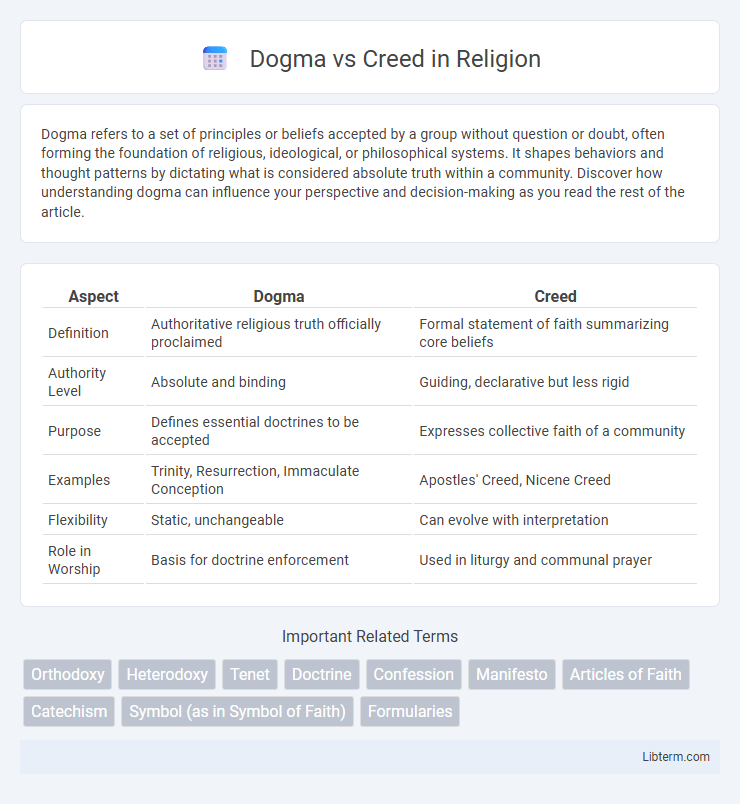Dogma refers to a set of principles or beliefs accepted by a group without question or doubt, often forming the foundation of religious, ideological, or philosophical systems. It shapes behaviors and thought patterns by dictating what is considered absolute truth within a community. Discover how understanding dogma can influence your perspective and decision-making as you read the rest of the article.
Table of Comparison
| Aspect | Dogma | Creed |
|---|---|---|
| Definition | Authoritative religious truth officially proclaimed | Formal statement of faith summarizing core beliefs |
| Authority Level | Absolute and binding | Guiding, declarative but less rigid |
| Purpose | Defines essential doctrines to be accepted | Expresses collective faith of a community |
| Examples | Trinity, Resurrection, Immaculate Conception | Apostles' Creed, Nicene Creed |
| Flexibility | Static, unchangeable | Can evolve with interpretation |
| Role in Worship | Basis for doctrine enforcement | Used in liturgy and communal prayer |
Understanding Dogma: Definition and Origins
Dogma refers to a set of authoritative beliefs or doctrines established by a religious organization that are considered incontrovertibly true and essential for faith adherence. Originating from the Greek word "dogma," meaning "that which seems good" or "opinion," dogma became formalized in early Christian councils to unify doctrine and guide believers. Unlike creeds, which are concise statements of faith, dogmas carry a binding force and often require acceptance without question within a religious tradition.
Defining Creed: Meaning and Historical Context
A creed is a formal statement of beliefs that defines the essential doctrines of a religious faith, often recited during worship to express communal identity. Historically, creeds such as the Nicene Creed emerged in early Christianity as concise affirmations to unify believers around foundational truths amid theological disputes. The purpose of a creed is to provide a clear, structured summary of faith principles that guide religious practice and doctrine.
Key Differences Between Dogma and Creed
Dogma refers to authoritative principles or beliefs officially established by a religious organization as incontrovertibly true, whereas a creed is a formal statement or summary of core beliefs used to unify followers. Dogma carries a higher level of doctrinal authority mandating acceptance, while creeds serve as concise expressions of faith without the absolute enforcement of dogmas. Understanding the distinction clarifies how religious communities define essential truths and express collective identity.
The Role of Dogma in Religious Traditions
Dogma serves as an authoritative set of beliefs central to religious traditions, defining core doctrines that adherents are expected to accept without question. These dogmatic principles provide a framework for theological consistency and preserve the integrity of faith across generations. By establishing clear boundaries of belief, dogma helps maintain unity within religious communities and guides moral and spiritual practices.
Creed: A Statement of Faith and Belief
A creed is a formal statement of faith and belief that outlines core religious doctrines accepted by a community, serving as a unifying declaration of identity. Unlike dogma, which denotes authoritative teachings declared infallible and obligatory, a creed provides a foundational summary of shared theological principles without necessarily carrying the same authoritative weight. Creeds such as the Nicene Creed encapsulate essential Christian beliefs, facilitating doctrinal clarity and communal cohesion.
Theological Significance: Dogma vs Creed
Dogma represents core theological truths formally defined and infallibly proclaimed by the Church, establishing essential beliefs that all adherents must accept to maintain orthodoxy. Creed, often expressed in concise statements like the Nicene or Apostles' Creed, summarizes foundational Christian doctrines and serves as a unifying confession of faith among believers. Theological significance lies in dogma's authoritative and binding nature, whereas creeds function as concise affirmations of shared doctrine, guiding liturgical practice and catechesis.
Controversies Surrounding Dogmas and Creeds
Controversies surrounding dogmas often arise from their rigid, authoritative nature, which can lead to conflicts when interpretations evolve or differ among religious groups. Creeds, while also statements of faith, tend to be more inclusive and flexible, causing fewer disputes but sometimes facing criticism for lack of doctrinal precision. The tension between dogma's strict orthodoxy and creed's summarizing nature highlights ongoing debates about doctrinal authority and theological boundaries within diverse religious traditions.
Influence on Modern Religious Practices
Dogma serves as authoritative doctrines that shape the core beliefs and rituals within modern religious practices, establishing non-negotiable truths for adherents. Creed functions as formalized statements of faith that guide communal identity and worship expressions across diverse denominations. The interplay between dogma and creed influences liturgical structures, doctrinal education, and the enforcement of orthodoxy in contemporary faith communities.
Dogma and Creed in Interfaith Dialogue
Dogma represents the established doctrinal beliefs held as incontrovertibly true within a specific religious tradition, often serving as non-negotiable tenets in interfaith dialogue. Creed, by contrast, refers to a formal statement of faith shared by a religious community, encapsulating core beliefs in a more inclusive and accessible manner. Understanding the distinction between dogma and creed is crucial in interfaith dialogue to foster mutual respect and identify common ground without compromising deeply held convictions.
Evolving Perspectives: Dogma and Creed Today
Evolving perspectives on dogma and creed emphasize their dynamic roles in contemporary religious practice, where dogma represents authoritative doctrines essential to faith identity, while creeds serve as concise summaries of core beliefs adaptable to modern contexts. Today, theological discourse often highlights the necessity of reinterpreting dogmas to address contemporary ethical and social issues, ensuring relevance without compromising foundational truths. The interplay between dogma's rigidity and creed's flexibility shapes ongoing dialogues within diverse faith communities striving for spiritual authenticity and inclusivity.
Dogma Infographic

 libterm.com
libterm.com